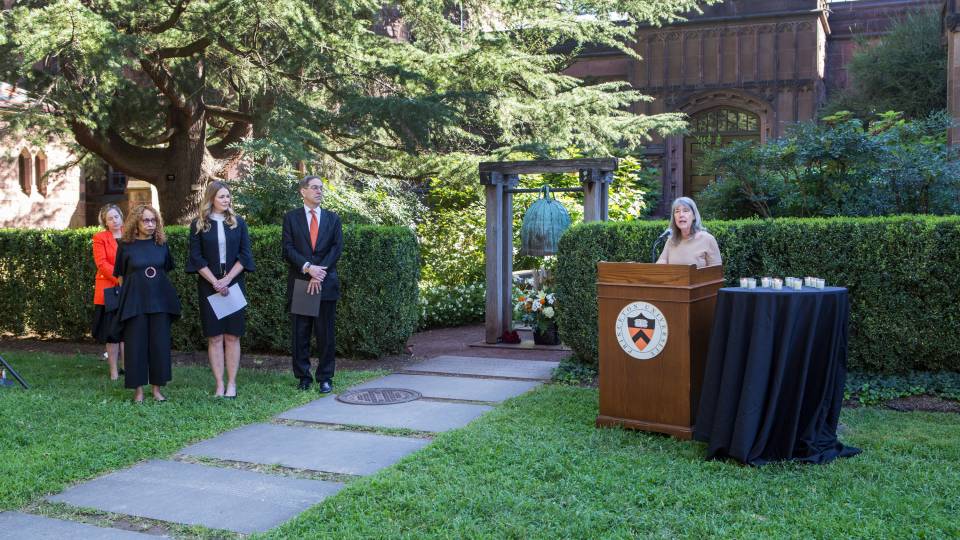At a commemorative assembly Wednesday evening, Princeton President Shirley M. Tilghman asked each member of the University community "to find your own way to contribute your particular talents and energies" to the ongoing challenge of responding to the tragic events of Sept. 11, 2001.
Before more than 1,500 people gathered on the University's Cannon Green, faculty members, students and staff members did just that -- singing, playing music and reflecting on their individual contributions and thoughts in the year since the terrorist attacks. The program ranged from the reflections of faculty members, who used the prism of their particular expertise to focus and clarify the sweeping questions left by the attacks, to electrical shop foreman Kenny Grayson, who led the assembly in singing "Amazing Grace."
"We are gathered today to remember, to reflect, and to reaffirm our individual and collective commitments to response and renewal," said Tilghman. "We come together as a community so we can share with each other the grief and the anger that we still feel, so we can take comfort from each other, and so we can strengthen our resolve to bring those responsible to justice."
"We are also here to recognize our common humanity with peoples of all cultures and nationalities," Tilghman continued, "and to renew our understanding of our collective responsibility for each other's well-being."
Associate Professor of Architecture Guy Nordenson spoke about his experience helping to organize 100 engineers who worked for 10 days in round-the-clock shifts to assess the damage to Lower Manhattan buildings immediately following the attacks.
Nordenson said he later was impressed to see how the individual efforts of so many people could come together in a democratic way to accomplish monumental tasks, and hoped that the same strength of purpose could be applied to the problems across the globe. "Clear observation, clear thinking and forceful deliberation is, I believe, our best defense and best way forward," he said.
Princeton junior Maureen Monagle told of her experience as co-chair of the University's Arts Alive program, in which several hundred Princeton students accompanied more than 10,000 schoolchildren from New York to live arts and cultural experiences in the city, and provided workshops related to the events.
Monagle recalled in particular a Broadway performance of "The Lion King," which was attended by 100 people who lost parents or spouses on Sept. 11.
"That June night, as we watched a story about the loss of a father and the grief, guilt and ultimate understanding of his son, the impact of the play upon these children was clear," said Monagle.
She quoted from a letter from the mother of a woman who lost her husband, a New York City firefighter, on Sept. 11. "There are very few things that she has looked forward to since that day, but she was so excited about receiving tickets to 'The Lion King.' If your organization's intentions are to bring joy and awareness of good things in a sometimes-cruel world, through the magic of stage and all its counterparts, then you have achieved your goal."
Caryl Emerson , professor of Slavic languages and literatures, reflected on how the countries of Russia and Central Europe have dealt with "losing thousands of lives overnight, a horror known to all countries at war" and the often harsh responses of their governments.
"In a way both palpable and strange, America has become more loved as she has become more resented, joining the family of nations, having our sky fall in too." But having been brought closer to those weakened nations, she said, the question is "Can a powerful nation, the most powerful nation, be both firm and wise?"
Alexander Nehamas , professor of philosophy and comparative literature, linked the terrorist attacks to the many natural and man-made catastrophes that have marked human history and called on people to "calm the shrill voices that lay claim to mor-al clarity, complete knowledge and invincible superiority."
"Unexpected catastrophes will never cease and, Sept. 11 shows, they will come in previously unimaginable forms," said Nehamas. "Sept. 11, 2001, did not cleave time or history in two. It is -- appallingly -- one of innumerable horrors, past and future, each of which demands to be addressed in its own specific terms. But if we manage to see, and react to, that particular event as a part of history, then Sept. 11 may have a lasting effect: It can stand for all unexpected catastrophes, as a reminder that our certainties are transient, our powers limited, our ability to control our fate- restricted."
The assembly also included invocations by the Rev. Deborah Blanks, associate dean of religious life and of the Princeton University Chapel, and Rabbi Dov Peretz Elkins, president of the Princeton Clergy Association, and a benediction by the Rev. Thomas Breidenthal, dean of religious life and of the chapel. Nina Langsam, a senior, read from the Book of Lamentations in the Bible. Scott Miller, a graduate student, read the Walt Whitman poem "On the Beach at Night, Alone." The members of the University Chapel Choir and other campus singing groups performed under the direction of Penna Rose, director of chapel music. The University Chapel Camerata played the postlude.
The program concluded after darkness fell with a second rendition of "Amazing Grace" performed on the bagpipe by sophomore Whitney Kalmbach and then with a moment of silence broken only by the sound of crickets.
The full text of the remarks and reflections is available online . The live Webcast is available on the WebMedia service's special events archive page.
Contact: Marilyn Marks (609) 258-3601
